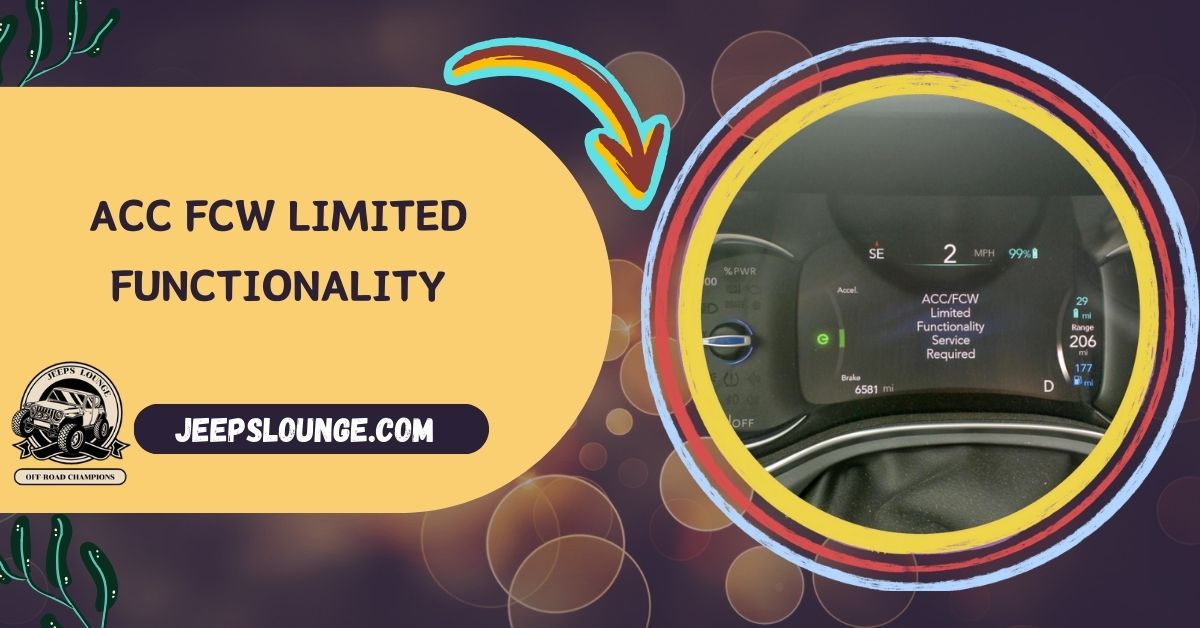You’re cruising down the highway, enjoying the comfort of Adaptive Cruise Control (ACC) and maintaining a safe distance. Suddenly, an alarming message flashes on your dashboard: “ACC FCW Limited Functionality.” Confusion sets in.
It’s a reminder that something might be affecting the performance of your ACC and FCW systems. While addressing the issue is important, it doesn’t automatically mean something major needs to be corrected.
Here are some instant solutions to sort out the causes behind them. So, get deep down the writing to have possible solutions.
Table of Contents
The Culprits Behind the Curtain: Why Functionality Might Be Limited:
Now, back to the enigmatic warning. Several factors can trigger the “ACC FCW Limited Functionality” message. Imagine these factors as mischievous gremlins tinkering under the hood, disrupting the smooth operation of your car’s advanced safety systems. Here are some of the most common culprits:
Sensor Malfunction:
Like any electronic device, the sensors crucial for ACC and FCW are susceptible to malfunctions. This can manifest as erratic behavior or complete unavailability of the systems, leaving you without their valuable assistance.

Camera Obstruction:
A misplaced phone mount, a layer of dirt, or even a pesky snowflake can block the camera used by FCW, hindering its ability to detect potential hazards and triggering the warning.
Weather’s Wrath:
Heavy rain, fog, or even bright sunlight can interfere with the sensors’ capabilities, reducing their effectiveness and prompting the system to limit functionality for safety reasons.
System Hiccups:
Software glitches or bugs within the ACC/FCW system can also cause limited functionality. Imagine tiny digital gremlins confusing within the system’s code!
Maintenance Mishaps:
Skipping regular maintenance, especially for components related to these systems, can lead to performance issues and warnings. Just like neglecting your car’s health can lead to physical problems, neglecting crucial maintenance can affect its technological well-being.
Taking Charge: Troubleshooting Tips to Get You Back on Track:
Now that you understand the potential gremlins causing the warning let’s equip you with tools to get them back in their place.
Simple Fixes
Sometimes, the solution is closer than you think. Start with the basics:
- Clean the camera lens: Remove any visible obstructions like dirt, snow, or even that misplaced phone mount.
- Please consult your owner’s manual: It’s your car’s instruction book! Locate a diagram of the sensor locations and ensure they’re debris-free.
- Restart magic: Try restarting your car’s infotainment system or resetting the ACC/FCW settings (refer to your manual for specific instructions). Sometimes, a digital reboot can work wonders!
Advanced Troubleshooting:
If simple fixes don’t work, your owner’s manual might offer more advanced troubleshooting steps for your car model. This might involve checking specific fault codes or performing system self-checks.
Remember, Your Safety Is The Top Priority:
While ACC and FCW are valuable assistive technologies, they could be more foolproof. Never ignore the “ACC FCW Limited Functionality” warning; always remain vigilant and maintain control of your vehicle even when they are active. Your safety is the most important factor on the road.
Navigating the Highway with Confidence: Understanding ACC and FCW
Imagine cruising the open road, traffic flowing smoothly, your foot barely touching the pedal. Sounds like a dream, right? With Adaptive Cruise Control (ACC) and Forward Collision Warning (FCW), this dream can become your reality.
But before you hop behind the wheel and embrace hands-free cruising, let’s first demystify these advanced driver assistance systems (ADAS) and understand their potential to enhance your driving experience.
ACC: Your Autopilot on the Highway:
Need to adjust your speed on long highway stretches? ACC takes the pressure off by automatically maintaining a safe distance from the car ahead.
Imagine it as your digital copilot, using radar or sensors to sense the traffic flow and adjust your speed accordingly. No more tedious pedal tapping, just relaxed cruising – but remember, ACC doesn’t replace your need for vigilance!
Benefits of ACC:
- Reduced fatigue: Long journeys become more comfortable, allowing you to focus on the road without constant speed adjustments.
- Improved fuel efficiency: Maintaining a consistent speed can optimize fuel consumption, saving you money at the pump.
- Enhanced safety: ACC can help prevent rear-end collisions by keeping a safe distance, providing an extra layer of protection.
Limitations of ACC:
- However, this is only for some situations: ACC might not function effectively in stop-and-go traffic, sharp curves, or adverse weather conditions.
- Driver remains responsible: Even with ACC engaged, you must stay alert and ready to take control of the vehicle at any moment.
- Overreliance can be dangerous: Don’t become complacent! Relying solely on ACC can dull your awareness and reaction time.
FCW: Your Guardian Angel on the Road:
Picture this: you’re distracted momentarily, and suddenly, the car ahead slams on the brakes. Before you even realize the danger, FCW springs into action. It detects potential collisions and issues visual and audible alerts using sensors and cameras, giving you precious seconds to react.
Benefits of FCW:
- Enhanced reaction time: FCW provides early warnings, allowing you to brake or maneuver safely, potentially avoiding accidents altogether.
- Increased awareness: The alerts are a constant reminder to stay focused on the road, reducing the risk of distracted driving.
- Improved peace of mind: Knowing you have an extra layer of protection can contribute to a calmer and more confident driving experience.
Limitations of FCW:
- Not foolproof: FCW might not detect all potential hazards, like sudden lane changes or objects on the road.
- False alarms: In some cases, FCW might issue warnings for non-critical situations, which can be distracting.
- Overreliance can be dangerous: Don’t solely rely on FCW to avoid accidents. Stay vigilant and maintain safe driving practices at all times.
Remember: ACC and FCW are valuable tools, but they are not replacements for safe and responsible driving. Always prioritize awareness, control your vehicle, and use these technologies as aids, not substitutes for good judgment.
Why is Your Safe Driving Duo On Hold? Unveiling the Mysteries of Limited ACC and FCW Functionality
Imagine cruising down the highway, enjoying the smooth assistance of ACC and FCW, only to encounter the dreaded message: “ACC FCW Limited Functionality.” Suddenly, your digital guardians seem less invincible. But fear not, fellow driver!
While this warning can be unsettling, understanding the potential causes empowers you to troubleshoot and confidently get back on the road. So, let’s delve into the most common culprits behind limited ACC and FCW functionality:
Sensor Malfunction:
Imagine tiny gremlins tinkering with your car’s nervous system! Sensor malfunctions, affecting either radar or camera sensors crucial for ACC and FCW, can be the root cause.
- Underlying Issue: Faulty hardware, internal component issues, or even software glitches can disrupt sensor communication with the system.
- Symptoms: Erratic behavior like ACC maintaining inconsistent distances or FCW failing to trigger warnings, potentially leading to near misses.
- Impact on Functionality: ACC and FCW might become completely unavailable, or their performance might be significantly compromised.
Camera Obstruction:
Think of your car’s camera as its watchful eye. Anything blocking its view can disrupt FCW’s ability to detect potential hazards.

- Underlying Issue: Dirt, snow, ice, a misplaced phone mount, or even a decorative sticker can be the culprit.
- Symptoms: FCW might not activate, or its warnings might be delayed and inaccurate, potentially increasing accident risks.
- Impact on Functionality: FCW is primarily affected, potentially becoming completely unavailable until the obstruction is removed.
Weather’s Wrath:
Mother Nature can throw curveballs at technology, too. Adverse weather conditions can interfere with sensor and camera performance.
- Underlying Issue: Heavy rain, fog, or even bright sunlight can affect the sensors’ ability to detect objects accurately.
- Symptoms: Both ACC and FCW might exhibit reduced performance, delayed responses, or false warnings, compromising their effectiveness.
- Impact on Functionality: The severity of the impact depends on the weather conditions. In extreme cases, both systems might become temporarily unavailable.
System Error:
Even the most sophisticated systems can experience hiccups. Software glitches or bugs within the ACC/FCW system can cause limitations.
- Underlying Issue: Programming errors, outdated software, or data corruption can disrupt the system’s internal communication and processing.
- Symptoms: Erratic behavior of both ACC and FCW, unexpected system shutdowns, or even complete unavailability of the features.
- Impact on Functionality: The severity can vary, ranging from minor glitches to complete system failure.
Vehicle Maintenance Mishaps:
Just like our bodies, cars need regular checkups to stay healthy. Skipping essential maintenance can impact ACC and FCW functionality.
- Underlying Issue: Neglected sensors, worn-out components related to the systems, or even low battery voltage can affect their performance.
- Symptoms: Gradual decline in performance, increased frequency of warnings, or eventual system limitations or failures.
- Impact on Functionality: The effects can be gradual or sudden, depending on the severity of the maintenance neglect.
Remember: This is not an exhaustive list, and specific symptoms might vary depending on your car model and system configuration. Consulting your owner’s manual or seeking professional help can provide more detailed troubleshooting guidance.
Don’t Panic! Troubleshooting Tips for ACC FCW Limited Functionality
Encountering the “ACC FCW Limited Functionality” warning can be concerning, but before you head straight to the mechanic, consider some simple troubleshooting steps. Remember, sometimes the solution is closer than you think!
Simple Fixes:
- Restart Your System: A simple system reboot can sometimes work wonders. Consult your owner’s manual for instructions on restarting your infotainment system or resetting the ACC/FCW settings.
- Clean the Camera: Check the front-facing camera for obstructions like dirt, snow, or a misplaced phone mount. Gently remove any debris with a microfiber cloth.
- Check Sensor Locations: Refer to your owner’s manual for diagrams of the sensor locations (radar and camera). Ensure they are free of dirt, debris, or ice buildup.
- Consult Your Manual: Your car’s manual is your treasure trove of information. Look for specific troubleshooting steps related to your car model’s “ACC FCW Limited Functionality” warning.
Advanced Troubleshooting:
If simple fixes don’t work, your owner’s manual might offer more advanced troubleshooting steps for your car. These might involve:
- Checking specific fault codes using diagnostic tools.
- Performing system self-checks.
- I was updating the software if available.
Remember: If you need clarification on these advanced procedures, seek professional help.
By following these tips and prioritizing safety, you can confidently tackle the “ACC FCW Limited Functionality” warning.
Don’t Get Complacent: Remembering the Human Element in a Tech-Driven World
While ACC and FCW can undoubtedly enhance your driving experience and contribute to safety, it’s crucial to remember they are not replacements for safe and responsible driving. Technology, no matter how advanced, has limitations, and ultimately, you are the one behind the wheel, responsible for your safety and the safety of others on the road.
Here’s Why Staying Vigilant Remains Paramount:
- Distracted Driving is Still Dangerous: Even with ACC maintaining speed, taking your eyes off the road or engaging in distracting activities can have disastrous consequences. Never prioritize texting, calls, or entertainment over staying focused on the road.
- Maintaining Control is Vital: While ACC helps maintain safe distances, unexpected situations can arise. Be prepared to take immediate action in case of sudden traffic stops, lane changes, or other hazards. Stay independent of the system to handle everything.
- Technology Has Limitations: Weather conditions, sensor obstructions, or system malfunctions can impact the performance of ACC and FCW. Always be aware of your surroundings and anticipate potential dangers, regardless of the system’s status.
- Overreliance Breeds Complacency: Don’t let the comfort of ACC soothe you into a false sense of security. Remain alert, scan your surroundings regularly, and be ready to react if needed. Technology assists, but it doesn’t replace your judgment and responsibility.
Remember:
Always: Keep your hands on the wheel and your eyes on the road.
Never: Engage in distracted driving activities while using ACC and FCW.
Be prepared: To take control of the vehicle at any moment, regardless of the system’s status.
Stay informed About the limitations of ACC and FCW, and don’t over-rely on their capabilities.
Faqs:
Should I Be Worried If I See The “Acc Fcw Limited Functionality” Warning?
Not necessarily! It’s a reminder that something might be affecting the performance of your ACC and FCW systems. While addressing the issue is important, it doesn’t automatically mean something major needs to be corrected.
What Are Some Simple Troubleshooting Steps I Can Try Myself?
First, check for any obstructions blocking the camera lens on your windshield. Clean it gently with a microfiber cloth. Then, consult your owner’s manual for instructions on restarting your infotainment system or resetting the ACC/FCW settings.
Will Future Advancements In Acc And Fcw Technology Eliminate The Need For Driver Awareness?
While future advancements hold exciting possibilities, like LiDAR and AI integration, it’s crucial to remember that technology will always have limitations. The human element of responsible driving and vigilant awareness will remain paramount for ensuring safety on the road.
Final Verdict
Remember encountering the confusing “ACC FCW Limited Functionality” warning? Understanding the potential causes of limited functionality empowers you to troubleshoot effectively. Remember, seeking professional help when needed is crucial. But most importantly, never compromise your safety or rely solely on technology. By utilizing ACC and FCW responsibly, combined with your attentiveness and responsible driving practices, you can create a safer and more enjoyable journey for yourself and others on the road.




